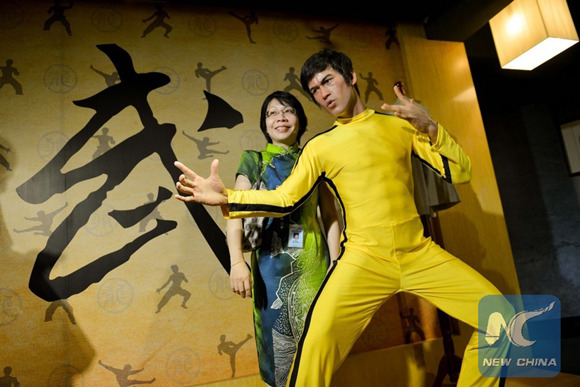
A visitor poses with the wax figure of actor Bruce Lee at the first wax museum in Selangor State, Malaysia, Aug. 15, 2013. (File photo: Xinhua/Chong Voon Chung)
In the shanty slum of Wakaliga on the outskirts of Uganda's capital Kampala is a movie studio that is little known at home but is gaining international fame.
Clogged trenches, semi-permanent houses are what makes part of the set at Wakaliwood, a movie studio run by Ramon Film Productions.
Isaac Nabwana is the brain behind Wakaliwood. In his childhood, Nabwana's brothers used to narrate to him Chinese movies they had watched at the cinemas. Nabwana could only imagine the moves in the movies.
"I was inspired by the stories of the Chinese movies. I remember some names like Wang Yu, Bruce Lee and later on Jet Li and Jackie Chan," Nabwana told Xinhua in a recent interview.
This sparked off his dream in the 1990s that one day he would set up a studio to produce movies. To begin with, he picked Kung Fu trainees from his brother's school to shoot video clips.
"The stories were not connecting because we did not have a script. It was a puzzle to me," he said.
Nabwana learnt how to write a script and in 2010, he released the movie titled, "Who Killed Captain Alex?' Since then, he has directed several movies, in which Kung Fu stunts never missed.
"We love the Chinese culture of Kung Fu which has its own importance like body fitness, self-defense ... we need that in our society, it is almost a medicine," Nabwana said.
"BRUCE LEE OF UGANDA"
As Nabwana continues to get international attention, he is focusing on the Chinese market. Apart from China having a big market, Nabwana hopes the Kung Fu stunts in his movies will speak more to the Chinese population.
One of the latest movies he has directed is "Bruce U," which was acted basing on Chinese film star Bruce Lee.
"Bruce Lee was famous here, and I think he is one of the few Chinese who sold the Chinese image in Uganda. And now we have Jackie Chan, Donnie Yen. But Bruce Lee made a very remarkable impact on us, so that is why I decided to call it 'Bruce U' meaning Bruce Lee of Uganda," Nabwana said.
The movie was acted by both Chinese and Ugandan actors. Some of the scenes of the movie were shot at China's the South Shaolin Temple.
The movie tells the story of a Uganda boy Kiwa, who loved Chinese Kung Fu since his childhood and gets a chance to learn Kung Fu at a Shaolin Temple.
"Smile Africa", a project aimed at helping spread Chinese culture in Africa, played a major role in the production of the movie by inviting Nabwana and his cast to the South Shaolin Temple to shoot some scenes.
AIMING FOR INDUSTRY TAKEOFF
Uganda's movie industry is still in its formative stages. Vincent Bagiire, permanent secretary of the ministry of information, communication, and technology, said partnership with countries like China are critical in developing the industry.
Bagiire, who was speaking during the premiere of "Bruce U" in August, said the movie industry can contribute to a more informed society, help shape attitudes and develop the minds of local viewers.
"We need to expedite the process to protect the huge potential that the industry presents to cause employment, as well as economic and cultural growth," he said.
Nabwana decided to have his studio in Wakaliga as it was not only his home area but also budget friendly.
"I know we need good cameras, computers but even without, you can not just sit, we have the talent, we have the passion, we can do it," he said.
"We have people who can make props, makeup artists, we have so many people coming together," he added.
Nabwana acknowledges that budget constraints are always a key challenge but is optimistic that over time, the industry will start generating revenue.
His dream is to set up a studio on a 10-acre piece of land, though he is currently operating on a piece of land that is less than half an acre.
"We are training children, they are ten in number. They are going to be the future of this industry. If you are to build a film industry, we have to start from children," he said.
"My dream is seeing a big studio with the young generation learning how to edit, direct and write scripts. That is my dream if I get money."
Nabwana has partnered with an American film promoter Alan Hofmanis to ensure his movies reach the international market.
Hofmanis told Xinhua in a recent interview that they have arranged tours to Europe, India, Kazakhstan, and the United States to promote Wakaliwood movies.


















































